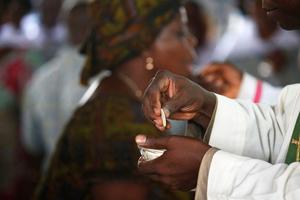This Year, Bring the First Friday Devotion to Your Catholic School
Pastors and parents: Why not raise this idea with your parochial school? Teachers and principals: How about it?

Among the Twelve Promises which Our Lord revealed in the 1670s to St. Margaret Mary Alacoque, the French nun who was instrumental in promoting devotion to the Sacred Heart of Jesus, was this final one:
I promise you in the excessive mercy of my Heart that my all-powerful love will grant to all those who receive Holy Communion on the First Fridays in nine consecutive months the grace of final perseverance; they shall not die in my disgrace, nor without receiving the sacraments. My divine Heart will be their safe refuge in this last moment.
That’s quite a powerful Promise: assurance of God’s supportive presence, especially sacramentally, in the most decisive last moments of life. We could not ask for more. Indeed, there is a long Catholic tradition of praying for protection against “a sudden and unprovided for death.” This pious devotion seems to answer that prayer.
Hence, my proposal: this year, let’s have Catholic schools promote First Friday Communion among students.
Once upon a time, that practice was commonplace practice in Catholic schools. I fear that, in some places, it has fallen into disuse, especially given the religious diversity of parochial schools, often now the refuge of parents — especially in inner cities — seeking safe, quality schooling free of the moral sludge often advanced in public schools.
I raise this proposal now so that pastors and Catholic school administrators can plan this into their schedules.
Why now?
Well, Academic Year 2022-23 offers a unique opportunity. Nine First Fridays actually fall during the school year: Oct. 7, Nov. 4, Dec. 2, Jan. 6, Feb. 3, March 3, April 7, May 5 and June 2. Depending on the year, First Friday in January may or may not fall during Christmas break, interrupting the consecutiveness of the devotion. 2023 seems to avoid that. Jan. 6, actually being “Twelfth Night,” is a good opportunity to explain the significance of the Epiphany. Many schools are likely to be in session Jan. 6, keeping the sequence intact.
Granted, April 7 is Good Friday — but we should encourage children to attend Good Friday services and, by that seventh month, we may hopefully have begun to kindle a child’s interest enough to test his perseverance. After all, is there any better day to emphasize the Sacred Heart than Good Friday, when that Heart was rent open? Any better opportunity to encourage children to go to church and maybe cajole their parents to bring them and attend themselves? It also prepares the child to assume some responsibility for maintaining the practice on his own come July 1, when school will be out.
At the very least, by June we will have provided a “spiritual immunization” for our children. Pope St. Pius X’s decision to admit children to Holy Communion at age 7 was in part motivated by the desire to foster Eucharistic attachment from a young age, especially an age when a measure of moral innocence may still be inferred.
We want our children to fulfill the terms of Our Lord’s Promise for their own long-term spiritual welfare. Graces from and memories of a good religious upbringing can play pivotal roles in a person’s future life, even if they might fall away from religious practice. This relatively simple practice merely involves some planning and some logistics involving children already in our care.
But we also want to go beyond the “terms” of the Lord’s Promise. By fostering the practice of First Friday Communion, we hopefully kindle larger changes in the young person’s life. These would include regular Communion; inclusion in one’s life and spirituality of popular devotion, such as devotion to the Sacred Heart; a sense of the distinctiveness of Friday as the day of the Lord’s Passion (a sense eroded among many Catholics with the loss of year-round abstinence); and the idea that joining in Mass beyond Sundays is not exceptional, unusual and even something desirable.
It might also kindle a regularity to the spiritual life.
What do I mean? I would encourage pastors, in conjunction with First Fridays, to consider the opportunity for Confession for these young people, perhaps staggered over the week preceding First Friday (depending on school size). The phenomenon of infrequent Confession and frequent Communion is an aberration in Catholic practice, and the incorporation of a somewhat regular (i.e., monthly) recourse to Penance can also build up two important habits:
- inclusion of Penance in the regular rhythm of a person’s life and
- restoration of the association between Penance and the Eucharist.
Without promoting scrupulosity, the notion of “confession of devotion,” i.e., the use of the sacrament as a way of progressing in holiness and a normal part of the spiritual life, can be advanced by effective catechesis on the relationships between the Eucharist, Penance, the Sacred Heart and love of God.
This is a pastoral plan of action with real consequences for young people’s lives.
Catholic schools exist to educate, but they also exist to form their students. They exist to bear witness to Christ, bringing students closer to him. For Catholic students — who should be the first concern of our schools — that closeness rightly finds sacramental expression. Restoring First Friday Communion, apart from its lifelong spiritual benefit according to the Lord’s Promise, can play critical concrete as well as pedagogical roles in shaping students’ sacramental praxis.
Pastors — why not raise it with your teachers? Teachers and principals — how about it? Parents — if neither the pastor nor the school staff has talked about it, how about raising it with them?
What’s holding us back?














